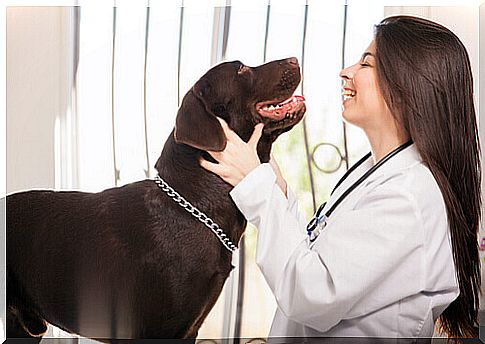Acute Abdomen In Dogs: What It Is And How To Cure It

The acute abdomen in dogs usually causes a lot of pain and is usually associated with diseases such as canine peritonitis. Early diagnosis is decisive in order to be able to intervene immediately with an effective and appropriate treatment for the clinical case. Here then is a complete article dedicated to the acute abdomen, in which we will present the causes, symptoms and possible remedies of this painful pathology that can affect your dog.
Acute abdomen in dogs: causes and characteristics
From a medical point of view, this disease is generally considered more of a complex symptom than a pathology in itself. The overall picture is complex and includes a number of well-defined effects: acute pain, diarrhea, abdominal distension, vomiting, malnutrition, weakness, depression and more.
In general, acute abdomen in dogs is almost always associated with pathologies affecting and compromising the health of the abdominal cavity. Among these, canine peritonitis is the one that most frequently affects animals, even of very different ages.

In some cases, however, the acute abdomen appears as a consequence of the aggravation of some chronic pathologies of the abdominal organs.
What is canine peritonitis?
By “peritonitis” we mean a sudden and painful inflammation that affects the tissues that make up the abdominal cavity (or peritoneum). As a result, the body accumulates a huge amount of fluid in the area, causing a noticeable and very noticeable swelling.
This intense fluid retention often also leads to severe dehydration and an electrolyte imbalance. If you have a dog, you will need to pay close attention to these symptoms. Do not hesitate even a minute and immediately take your four-legged friend to the vet.
Canine peritonitis usually occurs and develops very rapidly in the body. Many animals arrive late at the vet clinic when they are already in shock or even coma. In these cases, it is very likely that the veterinarian will immediately start a recovery therapy before proceeding with the diagnosis.
Symptoms of acute abdomen in dogs
The first visible signs of acute abdomen in dogs are usually not very specific. At first the animal always appears tired, with difficult and heavy breathing. Appetite is also significantly reduced. The next step involves the onset of tremors, excessive tearing and permanent groans due to abdominal pain.
The following symptoms are associated with advancing peritonitis in the animal’s body:
- Lethargy.
- Changes in posture and ways of lying down. It is common for dogs to try to find a position where the pain bothers them the least.
- Abdomen swollen and / or stiff to the touch.
- Sharp Pain: Many dogs can cry in pain as soon as the abdominal area is touched.
- Diarrhea : usually black (melena).
When inflammation impairs the intestines and stomach, it causes frequent vomiting. In addition, many dogs have high fevers.
As with most pathological conditions, the symptoms of canine peritonitis are aggravated by the progression of the disease. As we saw earlier, the animals arrive at the vet already in shock.
Therefore, the urgency of an early diagnosis is reiterated to allow effective treatment and avoid more serious complications. It is essential to contact your veterinarian immediately when one of the symptoms described above is observed.
Causes of acute abdomen in dogs
Most diagnoses of acute abdomen in dogs are related to endogenous and infectious causes such as:
- Infectious disease caused by a virus affecting the stomach and / or intestines.
- Viral gastroenteritis.
- Canine peritonitis.
- Presence of intestinal or stomach endoparasites.
- Uterine infection, usually bacterial.
- Presence of ulcers in the stomach or intestines.
- Abscesses on the spleen, liver, pancreas or intestine.
Non-infectious causes of acute abdomen in dogs
Many dogs may have acute abdomen due to non-infectious or exogenous factors, such as:
- Poisoning.
- Some types of tumors.
- Congenital diseases or deformities.
- Trauma in the abdominal region.
- Abdominal hernia.
- Gastric dilation.
- Kidney stones or gallbladder.

Treatment of acute abdomen in dogs
The specific treatment will be indicated to you by the veterinarian, after the correct diagnosis of the possible causes of the acute abdomen. Medicines and procedures will be focused on fighting and controlling the true disease which is the sole cause of this painful symptomatology.
First, your dog will be given intravenous therapies to combat dehydration and malnutrition. Analgesics will be administered to relieve the intense pain of the innocent animal.
However, since the pathologies associated with the acute abdomen tend to advance rapidly, surgery often becomes the definitive solution in a large number of cases.









